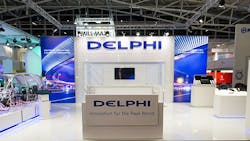Delphi Is Building a Software Suite to Help Detroit Catch Tesla
The cars consumers are already driving could soon get over-the-air software updates like those pioneered by Tesla Inc. (IW 500/227) that fix flaws or add features without a visit to the dealership.
Delphi Automotive Plc is building a suite of software designed to help automakers catch up to Elon Musk’s electric-car maker, which designs its vehicles with the ability to be updated remotely much like smartphones. The auto-parts supplier is shopping an aftermarket product that will let vehicles from as far back as 2010 update their engine control, braking systems and infotainment over the airwaves. Delphi’s over-the-air software capabilities could be built into new car models by 2020 if negotiations with carmakers go as planned.
Delphi bought Plymouth, Mich.-based startup Movimento in January for an undisclosed amount and has been snapping up others to transform itself into a software integrator that can help automakers collect and analyze car data to pinpoint flaws, extend the reach of recalls, patch cybersecurity vulnerabilities and speed the development of autonomous driving. Innovations including over-the-air updates have helped propel Tesla’s market value past legacy carmakers including Ford Motor Co.
“Traditional OEMs don’t have that luxury -- they don’t start from a blank sheet of paper,” Mary Gustanski, vice president of engineering at Delphi, said in a meeting with reporters in Allen Park, Mich., on Thursday. “This is a way to bridge that gap.”
Tesla is a pioneer because it’s been updating powertrains and battery-management systems via over-the-air software updates since 2012, according to Colin Bird, an analyst with IHS Markit in Chicago.
Other automakers do similar updates now, but not with the frequency or to the extent that Tesla does, Bird said. Daimler AG, BMW AG, and General Motors Co. all plan to introduce such updates in the “not too distant future,” he said.
Over-the-air software updates could save automakers as much as $35 billion by 2022 by reducing warranty costs, making software-related recalls more efficient and reducing service trips to dealerships, according to a 2015 report from IHS Markit.
While that may not go over well with car dealerships that depend on their service businesses to make money, Delphi argues carmakers could engineer a trade off with dealers by using data-driven coupons to push consumers to their dealers when they need an oil change or a tune up.
Even with Tesla, not all upgrades are available over the airwaves. The carmaker said on Thursday it’s recalling nearly two-thirds of the vehicles it made last year to replace faulty electronic parking brakes that may not release properly. The repair will take 45 minutes and requires the help of a human technician, who will do the replacement at drivers’ homes or workplaces, according to the company.
Startup Strategy
Delphi is leveraging the expertise of several upstart companies it’s bought in recent years to boost carmakers’ technological capabilities. It’s combining the over-the-air software of Movimento with technology from Control-Tec, a telematics and analytics company it acquired in 2015 that can mine data from a car to zero-in on flaws.
Another startup Delphi invested in earlier this month, Otonomo, will help automakers anonymize and sell driver data to third parties, a fresh, high-margin revenue source Delphi hopes to split with its customers.
Otonomo is already working with nine car manufacturers, including Daimler, and has lined up 70 different buyers who want to acquire car data, Ben Volkow, Otonomo’s chief executive officer, told reporters Thursday. A possible data-buyer could be insurance companies, which want to be more efficient about dispatching tow trucks, or retailers looking to plan store locations around heavy vehicle traffic. Hedge funds looking for economic data could also have an interest.
Drivers can choose via Otonomo’s software whom they want to share their data with.
“This isn’t Delphi or the automakers hoarding the data to monetize it without customers’ knowledge,” said Dave Ploucha, the president of Control-Tec. “It’s about allowing the customer to get access to the data that the machine generates, and figure out how to engage with the marketplace in the way that they like.”
By Gabrielle Coppola
About the Author
Bloomberg
Licensed content from Bloomberg, copyright 2016.
